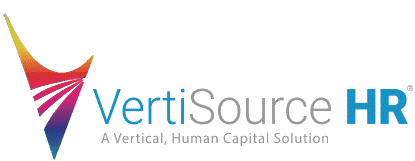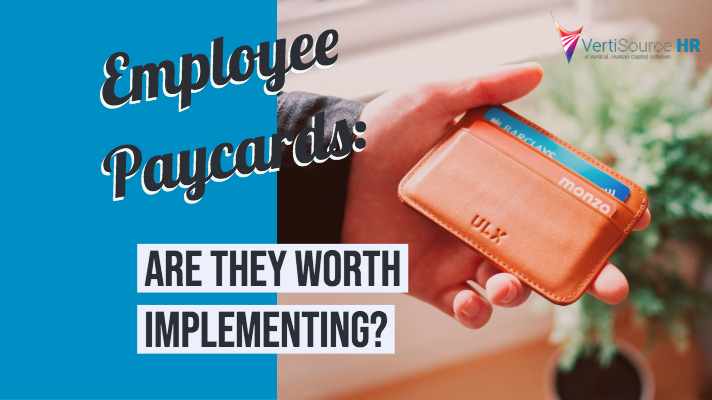Traditionally, businesses provide employees with the option of receiving their wages through a paycheck or direct deposit. Now, more and more businesses are switching to paycards, which can save employers money in the long run and help their ability to recruit talent. In the current state of our economy, does giving employees the option to receive money through a pay card makes sense?
Benefits of Paycards for Employees
According to Business News Daily, “ A paycard is a prepaid card offered by an employer to pay employees’ net wages. Once an employer deposits funds into the employee’s account, the employee can then use the paycard to purchase items, withdraw cash and pay bills.” Paycards eliminate all together the need for paper paychecks.
Although it is usually assumed that most Americans have a checking account, a 2017 FDIC National Survey of Unbanked and Underbanked Households proves otherwise as it estimates that “roughly 8 million households don’t have a bank account and another 24 million households are unbanked, meaning they have an account but also use financial products outside the banking system.” Employees could be blocked from the system for a number of reasons such as bad credit, past bankruptcy or financial issues from a divorce. Or they simply don’t want to maintain the minimum balance that many checking accounts require. “Otherwise, they could be paying $5 or more to cash each paycheck. Employees also won’t have to waste time going to a check cashing service.”
For young employees, it’s also found that they would rather have control of their finances on their mobile device than having to step foot in a physical bank branch. Paycards benefit Americans who are less comfortable handling cash and seek the freedom of handling their money from their phones.
Benefits for Employers
There are also a number of benefits of paycards for employers. According to a report by Today, “some organizations in the retail and fast food industries, for example, prefer to pay wages by paycard to unbanked employees” as this means your business isn’t paying more to employees as it does with checks. Paper checks need to be prepared, printed and distributed. Most of the time this is done manually. The American Paycard Association, states that “using paycards is 80 percent less expensive than paying for check-cashing services.” Consumer Action reports that “employers can save around $2 per employee when transferring funds electronically versus on paper.” The advantages continue such as minimal exposure to paycheck fraud, reduced bank service fees and elimination of stop-payment fees for lost or stolen paychecks.
Setting up a paycard program for your employees takes only a few weeks and the initial setup provides card kits and training to your employees.
This training bit is important. You can’t expect your employees to figure it out on their own so implementing an employee training program is vital to the success of this payment option for your business.
Paycards can also help employers with recruiting. According to ADP’s research, “Paycards: Generational Trends Shaping the Future of Worker Pay, “47 percent of Gen Z workers and 31 percent of millennials said they would turn down a job if they couldn’t choose their method of payment.” For the younger generation that is all about choice and customization to their own needs, you might be missing out on talent if you don’t add this additional method of payment. It’s about moving with the tides and embracing change.
State Laws
With any new change, be sure to do your research as certain fees might be charged to your employees depending on the state you are conducting business in. Point-of-purchase fees are the most common disadvantage to paycards as employees might be charged for accessing their wages at the ATM or for checking the balance on the card. There is work being done to combat this issue as some states are passing laws restricting the fees altogether. According to the Society for Human Resource Management, in Pennsylvania “employers may pay workers through payroll cards so long as certain conditions are met. Among other requirements, employees are entitled to one free withdrawal of all the wages they earned each pay period, and they must be able to check the balance on the card free of charge.”
More and more states are following suit, requiring that employees have a certain amount of free transactions a month or have free access to their full pay at least once per pay period. The following states have rules restricting fees: Arizona, California, Colorado, Connecticut, Delaware, Hawaii, Illinois, Kansas, Maine, Maryland, Michigan, Minnesota, Montana, Nebraska, Nevada, New Hampshire, New Jersey, New York, North Carolina, Oregon, Rhode Island, Tennessee, Utah, Vermont, Virginia and Washington.
Given that the number of Americans who don’t have access to a bank account is higher than expected, it makes the most sense to embrace this statistic and implement a payment system that works for your employees and potential recruits. While it seems that the pros far outway the cons for both employee and employer, perhaps businesses should take the time to research and see if this option is right for them in 2019.
VertiSource HR® currently offers employee paycards as a substitute for paychecks. Email us for more information at blog@vertisourcehr.com.
For more ideas on how to maximize small business budgets, check out our post on “Maximizing Payroll on a Small Business Budget with VertiSource HR® Cloud”.
.


